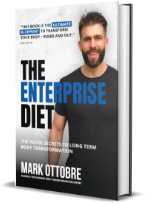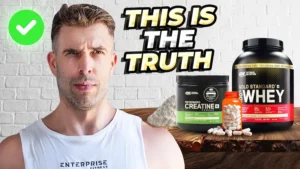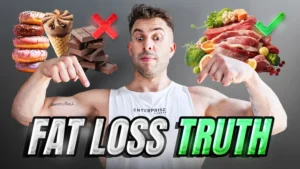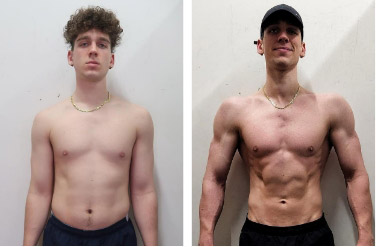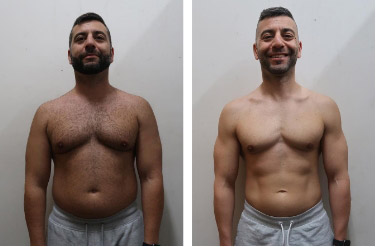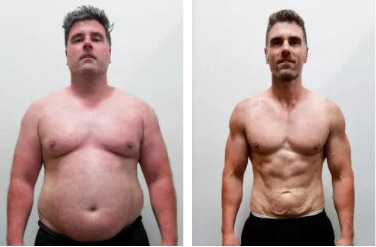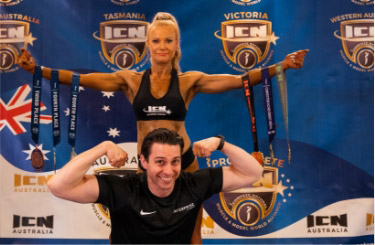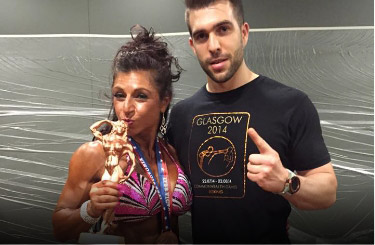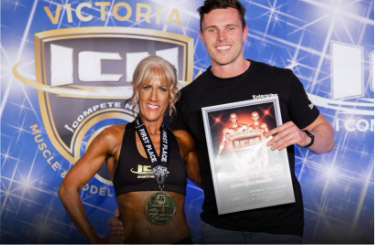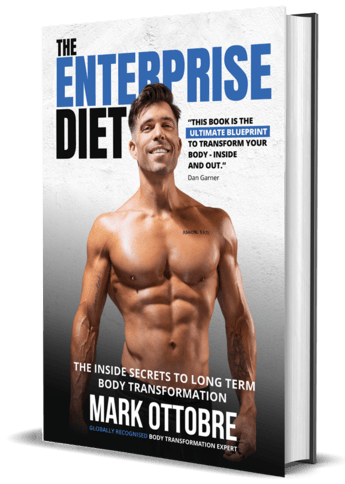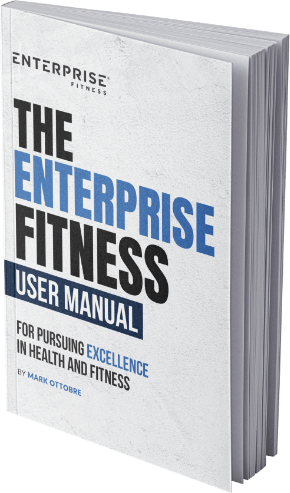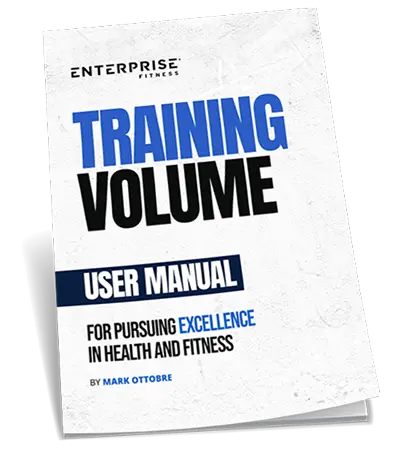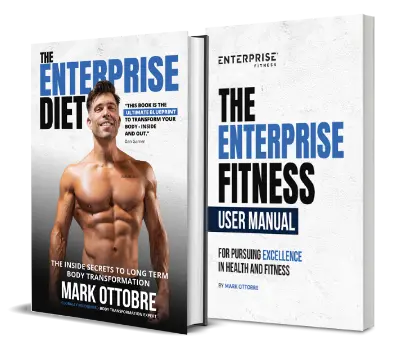Why do we self-sabotage?
You’ve nailed your diet and training Monday AND Tuesday, woop! You’re off to a flying start. It’s Wednesday, you ended up working a 12-hour shift, you’re tired and cranky, and just can’t be bothered to cook. You know what you deserve? Pizza! You order yourself a large Domino’s and some cookies to finish the day. Heck, why not?
Friday hits and you’ve mucked up in work; the boss has sent you a stern email ccing your colleagues. There’s no escaping the fact that you made a big mistake, and now everyone knows it. You head to the supermarket and pick up a big slab of chocolate to cheer you up.
It’s Saturday evening, and you’re sitting on the sofa finishing a whole tub of ice cream. Your date stood you up and now you’re left to Netflix and chill… alone… but that sweet creamy taste makes the loneliness a little easier.
Sunday hits… That 5kg weight loss goal isn’t getting very far.
Heard of the term ‘comfort food’? Well, that’s exactly what the pizza, chocolate and ice cream are; emotional coping mechanisms, because food makes everything better, right?
Although these scenarios are so common, it doesn’t mean it’s a healthy habit.
You’re self sabotaging your health and body composition through emotionally eating behaviours. These habits tend to be covering up a deeper issue, most likely stemming from past experiences.
Hypnotherapist, Forrest Toime, sits down with Mark to discuss emotional eating behaviours, the potential reasons behind them, and how you can fix your emotional reliance on food through psychological interventions, such as hypnotherapy.
Watch the full episode to uncover why you continue to yo-yo in and out of diets, and why you end up binge eating every week.
Listen on iTunes or Soundcloud:

Transcription of Wolf’s Den; Why We Self-Sabotage:
Please note, this transcription may contain errors
– Please welcome to, all right what do we got here? And people from all over are coming to see ♪ Riding with the wolf pack ♪ ♪ You gonna keep up dancing to the song ♪ ♪ Ooh, oh ♪
– Welcome to the show that punches you in the face with information, welcome to the Wolf’s Den. Today’s episode we delve in deep into a topic about sabotaging. Why do we sabotage? I have my friend here, Forest, who is a clinical hypnotherapist and a rapid transformation technique practitioner. So ladies and gentlemen, let’s give her a round of applause.
– Hello.
– And those watching on YouTube, we do have a live stream audience here and all the proceeds will go to the Royal Children’s Hospital. So, Forest what, firstly, how are you?
– Good. Thank you. Yes, very good. Yeah, it has been eventful summer, start there. But the bush fires have been a little bit sad, haven’t they? But other than that, good.
– Yes, what got you into a hypnotherapy walking into this line of work?
– I’ve, Marisa Peer taught me directly, so I studied in Los Angeles but she’s a very big, she created RTT, Rapid Transformational Therapy and she’s been a really big, really acclaimed therapist in England for a long time before she became global. So I knew about her a decade ago. I met her there and I actually got hypnotized by her way back in the day, she doesn’t do people anymore. And so when she started training her technique, the moment I found out about that I was like, right. But to play in probably that day and went over to Los Angeles and then met with her, yeah.
– So one thing I think we should get out of the way, ’cause I know there’s a few people. Every time we bring up the word hypnosis, everyone thinks, “Oh no, she’s gonna make me cluck like a chicken.” So that’s obviously stage hypnotherapy. What can you dispel some of the myths there on that kind of thing?
– I can’t make anybody cluck like a chicken or bark like a dog, wow. Actually that’s not entirely true. I could probably make about 8% of people here do that. And the way stage hypnotism works is they always know that the people in the audience going, “pick me, pick me, pick me, pick me, please. I wanna be on stage. Pick me. I want to become a dog.” They’re the ones that are gonna be really easy to hypnotize to do that. So other than that hypnotherapy, it’s just a deeply relaxed state. And in that deeply relaxed state, it’s easy to access our past memories and get down to the deeper thoughts that are going on. So a bunch of different brainwaves of being fired out when that happens. So when we go into that deep state, so yeah.
– So one of the things that like, when it comes up to me, if you’ll go, I know you’ve been hypnotized well, you know what’s it like? The way I always explain it is, it’s almost like, you know, I explain like personal training, right? The guys here who train with our team, they ultimately trust their coach and if their coach says one more, two more, they’re like, “Yeah, all right, I’ll do it.” But if there’s no trust in the coach, and the coach says one more, people are like, “Oh no, I’m not gonna do it.” ‘Cause they might be scared to hurt their back. Is that a fair comparison with hypnotherapy? You need to have that rapport, like you’re not gonna do anything that you don’t wanna do or go anywhere you’re not gonna go?
– More like, yeah, I guess. I don’t have that problem mainly because if people call me up and wanna book in with me, well, they’re turning up because they wanna come, right? So, the people that don’t wanna be hypnotized and never gonna come to be hypnotized, right? So it does require that commitment absolutely, it requires you to actually want to do that. That being said, sometimes people call out for their children or something. They say, “Look, my teenager needs this, my child needs this.” Obviously does that teenager want to do it? Or they’re doing it for their parents? I don’t know. But if you kind of set your client off for that success anyway, or someone says that my partner’s got stopped smoking, or he’s got to stop doing this or something. If you set them off in the same way, you can make them, you know, you can inspire them to commit within the session. But that is also important. Yeah.
– Yeah, especially the reason why I bring it up is because I know for me, you know you’ve worked on me and then I had amazing results. But dispel the fear that sometimes comes around with hypnotherapy that you’re gonna get someone to do something that they don’t wanna do or in spite of themselves and that just simply isn’t true?
– Right, yeah. No. Like I mean people come, they’ve got a specific aim, I work upon results. So, you know I can’t. Who wouldn’t make people do something they don’t want to? I become a dog.
– Yeah, what was special about, is it Michelle Pierce,?
– Michelle Pierce, yeah.
– Michelle. So I know hypnotherapy and obviously I’m not as anywhere near as well versed as you but her work, how was it different than say traditional hypnotherapy?
– Look, she’s evolved the technique. There’s a lot more kind of psychoanalysis, almost combinations of different techniques. So with RTT versus like Traditional Clinical Hypnotherapy, we almost just use hypnosis as an inroad to do like deeper work and work on deeper problems and that’s cycle psycloanalysis and that sort of thing to do that rather than just kind of priming the mind and influencing the mind with words. So if you see a talk therapist it can be quite superficial and it can take a long time to get the results. But if you’re going under hypnosis intensively for a few hours, well you’re working with the client on a deeper level, so what comes out of that session and the relationship you’re building within that session to understand the client is, it’s much more effective.
– Hmm.
– Yeah.
– Absolutely. What do you specialize in?
– In, in hypnotherapy?
– Yeah.
– I do a lot of people that come in for depression, anxiety, you know, it’s everywhere in society and so I do a lot of that. I also do a lot of trauma and PTSD based work and that’s mostly childhood traumas, usually people suffering from PTSD in a recent event, they tend to have been the reason they’re suffering so much intensive as it should been, because that’s kind of touching upon traumas in their childhood as well and then when there’s a big one, people were sugar addictions, that sort of thing that are really struggling of food. So if it’s between, you know, the extremities, obviously eating disorders, bulimia, but then there’s so many people that are stuck in the middle that are doing, you know, they’re just, why doesn’t my diet work? Why am I bingeing on sugar or carbs? Or why can’t I control myself? And people can be really mortified discovering that they’ve got this really uncontrollable behavior.
– So let’s go there. Why can’t people control themselves?
– Oh, it’s a big question. So, it works like this, right? It’s based on childhood experience, right? So for each person, the reason why they can’t control themselves can be completely different, right? So it comes down beyond that on a deeper level. There’s really similar things going on but in childhood we get all sorts of messages about food. Food plays a huge role in our day to day life. So for example, if somebody has a sugar addiction, right? So they come and they say, I can’t help it. Like, you know, I set myself fire off, I do these sites, whatever, I find myself 5:00 PM, 6:00 PM in the cupboard eating loads of sugar or I go down to the supermarket, buy loads, can’t help it, right? What you’ll find is that they’ve got really, really, really strong neurological associations around sugar and they’ve been building for a very long time. It’s not something new to them. So it can be something from, let’s say one example, if a client was a sibling rivalry, so her parents would reward a sugar, super common thing. It’s like, if you’re a good girl, you’ll get sugar, right? And if your is a better girl, they’ll get sugar and then the sister gets sugar and you’re like jealous, right? It becomes meaningful to a five-year-old right. Obviously if somebody did it to us as adults and we didn’t have that experience where we would have a lot more kind of wisdom to control the outcome, right? But you’re five years old, somebody says to you, all right, if you’re a really good girl, you can have this big ice cream, right? And then what if you misbehaved because you’re only five and you can’t really control yourself, right? Kids, you know, they run off, they do all sorts of things, they get distracted and you don’t get that ice cream. All of a sudden the ice cream in your mind becomes this really big deal, right? And so repeated experience is like that and childhood can basically create this really strong neurological association. So the client that, a client that might have a background like that, right? She or he would come to associate, if the parents always use sugar as a reward associate being a good person or achieving or being successful with getting ice cream, right? And people come in, they have very specific foods they can’t help. They’ll say, “It’s chocolate biscuits.” I don’t know why, but it has to be chocolate biscuits. I need chocolate biscuits that’s all like, you know, that’s, that’s what I go to. It’s gotta be biscuit so something like that, and they’ll have a really strong association and experience from childhood that involves, evolves that, right. Other than associating, having associating like ice cream say of like being a good girl or almost something positive like success, often people like that, you know, they’re driving towards success, they associate it with positive experiences, they feel good having sugar, they’ve got a lot of pleasure to do a fit, right? There’s also people that might have that ice cream and suffer extreme guilt, extreme shame. It’s not a pleasurable experience, it’s not great. At the end of the day, I did a great job at work, I get an ice cream. It’s, I feel so bad. I feel so guilty. This is the worst thing and they come and they’re mortified, and what you’re typically seeing a client like that is, there’s perhaps a controlling parent who, who didn’t let them have anything or maybe gave sugar to their little brother, right? But not to them, so the little brother gets a chocolate biscuit, but then never ever allowed that, you know, they might have a step parent who’s obsessed with the weight of the girls and the family or something, right. So it’s quite very traumatic, right? It’s associated with a lot of trauma, but people like that tend to have memories of, you know, by the time they’re 13 years old, parents are out, they’re in the cupboard and they’re eating the chocolate, biscuits they’ve never been allowed and then maybe they’re replacing it and they’re hiding all their actions and things and they had get this huge reward hit from it. Because of course the other issue here beyond those kinds of experiences growing up, that can ’cause these really strong associations that make people just that they can’t control it, right? The other aspect that’s going on here is, you know, the types of foods that people have problems with when it comes to weight is like industrialized manufactured food. It’s foods that have lots of sugar, high carbs, there’s a fat.
– The bracet point, the perfect amount of sugar solving fat.
– And it’s always manufactured. It’s never like nobody comes in and says, “I can’t stop eating carrot and cucumber sticks.” And having lean protein is always like the crazy, you know, it’s a crazy foods that are made by, you know, these manufacturing companies that give the biggest hit that delivered for that, right? They’re created for that. So, there’s the aspect of the neurological associations, like the psychological, the emotional, the growing up. There’s also this aspect of food where it’s like, if you’re eating industrialized food or manufactured food, it’s addictive, right?
– There is a physiological response.
– It’s a physiological response. People are getting the dopamine, the serotonin, insulin is being secreted, leptin is being down regulated.
– Injecting yourself of heroin for some of those foods, right? The physiological response is huge, right? And we’ve been too primed with that, like as children. So even as children when parents get that reward, can you imagine like if it physiologically does that to adults, it’s like a 10 times hit for children. And if you’ve ever seen little kids at a pasty having, you know, lots of candy around them for the first time.
– It’s like they’re reading opioids.
– It’s like being in a club watching people going off their face and access it, right? They’re going nuts having those first experiences of lots and lots of, you know, these addictive sugar coated candy foods or fatty foods, they’re going crazy, right? So, this is aspect of addiction as well and that’s something that you’ve got to look at as a physiological influence as well because what happens is right, we’ve got these emotional background, we’ve got the psychological background, right? And then as an adult you then, if you have that same food as a child, right? You’re also just further instilling the issue, right? It’s becoming deeper and more of a problem because there’s this whole addictive aspect as well. This is aspect of just these types of foods are gonna do this to your body.
– And you need more food to get a bigger hit as well.
– Right. Then your blood sugar drops and then you need needed again, you know people get rude as raving hunger. Usually that raving, raving crazy hunger is because they’ve lost all their chemicals. You know, they need it again. It’s the food addiction issue.
– Well, often I say to clients, you know, when you go home and you wanna have that, you know, cheesecake at night, you’re not eating it, you’re actually grabbing that food and rubbing it on your brain. You’re inducing serotonin to calm down after a big day. It’s the same people who drink at night or do drugs to calm themselves down, it’s chemical.
– It’s a perfect thing to say to people as well, because it’s about the way we get out of this. A big part of it is about using the visions as well like you’re rubbing a cheeseburger into your head like who would do that? Right?
– That’s what people do.
– But you know, that sounds crazy but obviously it’s what people do. Yeah.
– So let’s talk about self sabotage specifically. And I just gonna want to frame the question a little bit, ’cause I really, very curious to hear your thoughts. I wanna hear you dismantle it the way you do.
– Yeah.
– There is a school of thought that talks about self-sabotage as it’s kind of a misnomer and it’s not really a thing it’s, there’s no such thing as self sabotage for the perspective of like the John Dimartini way of coming at it is everything happens for a reason or you get benefits from those things and you’re getting a benefit from, let’s say you wanna be six pack ripped with abs and you go home and you late night eat all the time and you get a benefit from that because maybe the abs is something that you can’t deal with, or you get more benefit from eating the cheesecake than you do from being leaned ’cause then if you were lean, there’s also negative stuff that’s linked to that, like buying new outfits, spending money, maybe attention from the opposite sex that maybe be unwanted.
– Right.
– So firstly, I suppose the first part of the question, what is self sabotage? And is it real? Is it even real?
– Right. Well, it depends I guess the way you said it, it’s like framing it in different ways, like what do you define? What do you see as self sabotage? Right? And be it self-sabotage or not that really interesting point you brought up about John Demartini and this is what I say to, like all of my clients, they come in and they’ve got a phobia or like out of control, eating issues, right? The secret eating, you know, you name it and they come and they’re like, I just feel so crazy. Like I don’t understand why on earth I find myself in the cupboard just eating as much as I can. Like, I feel nuts. Like I can’t control myself. It could be, should be something so simple for me to do as an adult, but I cannot do it, right? And the first thing I always say to my clients as well, what you’re doing for you is completely rational, right? It’s not crazy what you’re doing like that phobia, that uncontrolled eating, it’s not, it’s completely rational to your mind, it’s not crazy behavior, and I say the reason is, it’s because you’re behaving, due to like your past experiences that have been built upon. So, you know, to answer the question of, you know, self-sabotage from there, well, you say, well, people are just acting upon what’s rational for them, right? So, you know, it could be that, you know, going to, so people like say, if I got skinny, I would attract the opposite sex, right? Another example could be, you know, you get people come in and they create this idea, when the children like, if only I were big, if only I were bigger, I could protect my mom from being abused by my alcoholic father, for example. If only I was big, if only I was bigger, I could get out of this crazy home, I could go to my own thing if only I was big if only I was bigger. Well, while you grow up and you have this really strong association with being big, like being big means you protected. It actually makes you feel strong, right? Because that’s all you wanted as a child, you repeated it to yourself, you repeated it to yourself over and over. If only I was big if only I was bigger, this would be so important. It could mean, you know, the world’s me, it’s about protecting myself. So for some people it’s so important to them to maintain that weight. It’s really meaningful emotionally to them, you know, from their background for that to happen. So are they self-sabotaging? Where they go and try and try or eat healthy food and find that they still can’t, they just cannot, they continuously fail. Well, they aren’t, right? For them, from their perspective, it’s completely rational what they’re doing. They just haven’t done the deep inner work to realize what’s going on, why their pattern of behavior actually makes sense to them?
– So rational from unconscious minds but not from the conscious mind.
– Well, from an outside perspective, you know, eating uncontrollably and making yourself sick, you know, we probably wouldn’t say that that’s rational behavior, right? But from the subconscious perspective, from the perspective of who you are, what’s happened in life and how you’ve grown up, it makes sense.
– So on the topic of unconscious minds, I mean it’s been defined over the years, decades by a few different psychotherapists from Freud to Jung, someone I heard an analogy around the unconscious mind as being your, basically little brother or little sister who really wants to please you, if you were to deconstruct the unconscious mind, how do you define it? And what would you?
– Your little brother or sister who really wants to please you, that’s good. That’s a good, that’s sort of like the inner child speaking and I guess the wisdom in that is, wow. One of the principles of the subconscious mind is that we’re wired to move towards that, which we associate with pleasure and to move away from that which was associated with pain. Like in that is like so standard. I think like all animals have that same primal instinct, that’s the subconscious mind go towards what’s pleasurable away from what’s pain. That’s how we survive, right? It’s how the most single organism like survives, right? Oh, that’s poison, we won’t eat that, you know, even like a piece of algae or something, right? So that’s the number one aspect of the subconscious mind. There’s that really, really deep primal layer which is a big thing that you work with when you deal with people sugar addiction or things like that. And then I would say on top of that, well, what is pleasurable to you? What is painful to you? Right? And that’s built upon, once again your experiences in the past, your experiences growing up, what did you learn was pleasurable? What did you learn was painful in your environment? How did that help you to survive?
– So I want to come back to one of the points that we were talking about earlier with neurological linking here’s what I told our clients your enterprise fitness that we’re having a show on self sabotage and you were coming in, I had one of our clients basically say to me, you know, I unfortunately couldn’t make it here today. But she said that, you know, if she’s, you know, she gets her measurements done and if the measurements, you know, thumbs up, she’s lost that kilo, that percentile, two kilos, whatever, she finds herself on the way home, she’ll eat, stop by the drive through whatever, get McDonald’s or get the chocolate bar, whatever it is, and she really wants the results and she said, you know, she spent over $40,000 over the years, and it’s not a case and the advice that kind of keeps getting repeated to her is that you don’t want it bad enough. And for her it feels almost like an insult ’cause it’s like, “Well, I do want it bad, but why do I keep doing this?” And she can’t figure it out.
– It sounds like for her because she’s hitting her measurements, she associates it with success, right? She actually has really positive associations. The problem is the positive pleasurable associations aren’t working in this situation because it sounds like great, I’ve done a great job, I get the candy as a kid, I’ve done a brilliant job, I cleaned my room mommy gives me a chocolate biscuit, right? I get the weight results, I get my measurements right. Brilliant. I get to go and have McDonald’s, right? I had a happy meal as a kid. So it sounds like she’s actually, for her, she is probably associating with success. I mean the human mind and all about the variety of experiences obviously as wide as the sky, but you know, it sounds like that’s what’s going on for her. So it’s actually not associated for her with something negative, it’s like she’s rewarding herself because she sees McDonald’s is being happy, right? She’s happy about her results and that’s so strong for her though, you know, how many kids got to go to McDonald’s? It was like the happiest place and well, in the world long time ago, there’ll be Ronald McDonald, their grandma’s Hamburglar whatever, girl you know mom and dad take you to McDonald’s, it’s like an awesome time. So she’s just associating it. If that’s what she’s suing, she’s probably associating those experiences with happy, pleasurable, brilliant times.
– So in, in saying that, I mean the ways to solve or help start that, like where does one begin?
– Right. She needs to realize that that might be a really, really happy thing to do as a little kid, but as an adult, it’s just not really serving her any benefits, right? Because I assume then she goes backwards and she has to work her way or whatever, right? So not serving her any benefit. So, you know, going back to what the subconscious mind is and that really primal driver of it, what is pleasurable? What is painful? what she needs such roaming into herself is doing that rewiring work like, McDonald’s isn’t pleasurable, like all the disgusting things about McDonald’s, create those visions, you know, rubbing you know, big mark into your hair and letting like the chemicals and the like weird creepy fats like absorb into your brain, dripping down, about tomato sauce over here. You know, she’s got to start associating that with like McDonald’s gross, yuck. I would never do that. Like, no. Like what pleasure is for me? You know. And she needs her place. Like what is a way to celebrate? That is like, you know, that’s aligned with she’s doing here, right? Like what is a better way? What is something more perishable? She needs to come up with that as well.
– So one of the things you were touching on before is that a lot of it is about associating a positive or negative component to a memory. So when you’re a kids over the sugar person who keeps eating sugar and can’t lose weight, they know everything they’re supposed to be eating but then still donate the right things.
– Yeah.
– Is it like, to me, it seems almost too simplistic that it’s just a memory of either, I mean is it, is that the answer? Like it’s either a memory that is exceptionally positive or a memory that is exceptionally negative that causes someone to move away from their goal or move towards, or sabotage that behavior.
– Look in a sense, it kind of is that simple, but obviously the human mind makes things really complicated. So, you know, in a session, you know, yeah, it is. It is literally about associating that but it might not be so easy to just attach like, say like, oh, I love McDonald’s, I’m now gonna start telling myself, I hate McDonald’s. You probably have to go back and address what those points are. It tends to be as well the people that are struggling the most that are like outlying, so, you know, 98% of diets fail anyway, because, you know, the word diet isn’t a sustainable word. It’s not like this is going to be what I do. This is my lifestyle, this is who I am. Diet is just like something that’s probably really extreme and not sustainable, right? So that’s why they fail but you know, it’s got to be that approach where you sit down, you think, you know, why is this? And the people that are really extreme that have eating disorders are really extreme addictions, really extreme problems of bingeing or that sort of thing. It tends to be that I find that they’ve got much more complex background with food, like it can go back to a parent that’s really controlling. So, you know, it’s mean, right? That, that upbringing is sort of like really, really strict. They bring up the way, they might weigh their own child. They might sort of, you know, eat chocolate biscuits in front of them themselves, and they’re not allowed it, and that’s like torture for a kid, you know, that’s a drug that they want that they will love and to do that can be really, really hurtful. So there’s those painful associations as well and there’s trauma there. So it tends to be when people on the really extreme size of it, they’ve had a really, you know, psychologically twisted time with food. For people that are just much more in the middle of the struggle, you know, that pleasure pain thing is, it’s a lot simpler to decode and sort of work out.
– So coming back to the self sabotage topic, when you, some says to you, “Hey look, Forest, I need you to fix me a self sabotage.” What is going through your head when you hear that word?
– Well, the first thing I wanna know is like, well, how yourself self sabotaging? What do you feel? Right? Because, you know, you can break it down in another way, you know, often people have created mechanisms, right? So when you self sabotage, I guess what that implies is that you are doing something that you know you shouldn’t be doing, it’s not aligned with like what you wanna be doing, right? It’s not aligned with your goal. You’re doing something that you don’t want to be doing, right? But it’s uncontrollable to you. So the first thing that says to me is what’s happening? Like on a neurological level, it amygdala, right? It’s sort of really fine tuned, right? It reacts to emotions, right? And that’s basically reacting before our prefrontal cortex, right? The part of us that goes, right this is a goal, this is what I want to achieve. That’s reacting before your prefrontal cortex can intervene. Right? And when that reacts, it lets out a bunch of chemicals and a bunch of signals and you physically act, you physically behave before you can intervene, right? So you’re already in this spiral of doing that thing that you do that self sabotaging thing that you do before you can intervene and say, wait, hang on. This is absolutely not. So people kind of find themselves doing something out of their control and then afterwards, they’ve got a whole range of emotions. Like why did I do that? Like, I didn’t want to do that. That’s not what I want to be doing. That’s not my goal, right? So that amygdala is really controlling it and the way that works is, once again it’s built on experiences. It’s sending out when it’s overriding the power of your prefrontal cortex, when it’s doing that and you’re not intervening, what it means is it’s like triggered like an alarm bell. If you imagine an alarm bell and that alarm bell has learned over time, what those really strong triggers are that caused that reaction. So, and it can be anything, right? Like we’re basically born able to, you know, why there any way, that our experience is?
– And when you say alarm bell that can also be positive or negative.
– Can be positive, right? Like if there’s a saber-toothed tiger and you’re in the jungle, you know, and it comes up to you and you like fight or flight, right? Brilliant, right? It’s really, really, really great survival tool. It gets you to act before you can think and sometimes we absolutely need to do that, right? We need to think on the spot, in the moment, figure out what to do and just go into that driver mode, right? But when you’re doing that and you’re in the cupboard and you’re just binge-eating, you’re going like, what the hell is this? Right? Well, the same system is working in a way, but it’s obviously so far removed from those sorts of situations, right? So it can be really positive. It’s absolutely fundamental to survival but it can get all of these ideas in it that makes you go, well like, like react. So for example, somebody with anger management, they might come in and they say, “I self sabotage my relationships.” Because somebody will do something and it’s really slight and I know my partner is a great person but I just, I can’t control it, I react, I get angry, I get aggressive, I start yelling, right? I can’t control myself. And what’s going on is they will have a history where that person’s done something slight. That’s triggered a history of things that I’ve learned where they’ve got to react as if they’ve got to fight that situation. Once again, maybe it’s an abusive parent or something and they’ve learned that they’ve got to respond in a certain way to survive that scenario, right? Or you know, it’s a whole bunch of things could happen. So you react and it’s not what you wanna be doing but you’re just overriding your cortex. That’s saying like this is our goals, this is what we want to do, this is how we wanna be. It’s going before that so a lot of the work in RTT, it’s almost like toning down that reaction being like, look these traumas they happen but it’s time to let go of them. It’s time to release them. It’s time to get to a better place, take the alarm bell down, just slower that reaction in that response so that you can start training your prefrontal cortex, so intervene and have the, have the thoughts that are like, that are gonna lead you to the path of success.
– I feel like sometimes when you do that hypnosis voice, I feel like putting disclaimer on this, don’t listen to this in your car.
– Yeah, you don’t have to listen to my voice in the car, if you had come in and had therapy with me here.
– Yeah. So what I was gonna ask is now I’ve gone into hypnosis mode. Now what I was gonna ask is you’ve done a really great job at painting the picture of what the problem is, what do we do about it?
– It depends where you lie on the scale, right? And I would say that one of the first things you can ask yourself really is, well, you know, say taking the topic of weight, right? Well, one of the first things you might ask yourself of, What are my childhood like? What are my issues, right? Like, what is, literally define what’s going on for you Like, these are my triggers, right? What triggers me? What are the particular, are there particular foods that I’m eating? What kind of food is that? Is it fancy and salty? Is it McDonald’s, right? Or is it ice cream and shock? Or is it biscuit? So like, what is it, right? Define what those foods are. What is actually problematic? What is happening? What the trigger is, right? Like, is there something that happens that makes you do that, right? Is it because you feel, and this is another big one that comes up? Is it because you know, that you get that comfort nurturing feeling from sitting on the tally and eating dessert, right? Do you get that feeling? Maybe you had, you grew up with a grandma who give her love and make you desert and bring to you and you’ll get to get rubbed up and get a towel and you have these beautiful memories of it, right? But they’re not helping you anymore. So you have to think about what are the foods? You know. Is there anything that triggers me? Is it because I want to be comforted in that moment? Am I feeling alone or disconnected? Am I stressed out? Or like my alarm bells ringing, right? Am I, am I anxious? Do I need food to chill me out? Right? Am I using food like a drug? Right? So you figure out, you know, what it is for you. I would say it’s a number one and then I would basically start to reflect and say, well, what are my childhood experiences? What, do I have any memories to do with this food? Right? If it’s McDonald’s for example, did I use to get to go to McDonald’s as a treat as a kid with like my favorite auntie, right? Was that, you know, really happy experience. So figure out, what is it that comes to your mind that’s associated with that in terms of your past? Like what is your history with that food, right? What is your history surrounding that? And that will give you more of an understanding about, okay, well now I can start to connect the dots, like this is past here. This actually, it’s not like one day I woke up having never ever eaten ice cream or chocolate in my entire life. And the next day I was this crazy addict and I couldn’t ever stop again, right. It’s usually, there’s a history there, right? So figure out what that is. Was it just so much fun going to children’s birthday parties and getting to eat candy because you weren’t allowed to at home? What is it for you? And once you have the idea, I think this is a bit of being a bit practical around it. You can start to really challenge yourself on that say, well, you know, I’m going to McDonald’s because I associate it with so much joy and pleasure, right? But really, is it that joyful or pleasurable, you know, like, is McDonald’s that joyful pleasurable? I mean, to me, no, like I just don’t, there’s no appeal to me whatsoever for McDonald’s. So you’ve got to say to yourself, well, why is it like? why do I like that? And is that really like, Is that the best thing I can do with my Saturday or the best thing I can do when I wanna celebrate, go to McDonald’s, right? And what are other things that you can do that are better? ‘Cause, I mean, it’s McDonald’s, why is it that great? Like, is there anything that brilliant to it? Same as eating ice cream. Is ice cream like the best thing you could ever come up with in your imagination to do, right? So find things, they’re more pleasurable than that, right? And also start listing out and thinking about, well actually, you’ve got to take that thing. You’ll say, okay, I associate pleasure to this, right? You’ve got to take those items and say, well, hang on. But it does all these things to myself and like when I think about it as a food like if I like deconstructed all the ingredients that go into that ice cream and it’s chemicals and some like weird unnatural like oil and like some fat, like basically or some like cows pass or something, right?
– Anchoring in the negative ingredients to that thing. yeah
– Anchoring it, right? You know, and say like, isn’t that nice to you? You know, you wanna try and stop making yourself go like, Ooh, gross like, I don’t find that pleasurable at all when I think about it as an adult. I like fine, maybe I liked it as a kid, but God like when I think about it it’s actually a disgusting food, so start anchoring yourself, figure that out. Be really planned about it.
– Yes. I can completely relate to what you’re saying. I mean, I grew up obviously I’m Italian, Ottobre is October in Italian.
– Napoli, right?
– Sorry?
– Neapolitan?
– No, my mum is from Cecilia and my dad was from Colombia. So yeah. When I was like, you know, I was the fat at school, Italian culture, I was always mangia, mangia, mangia, You know, go to my nonna after school and be a ham and cheese, a sandwich and in the microwave and you know, if I didn’t eat, it was like, what’s going on? And it’s just, that’s what it was. And we’d have like chicken wing eating contests ’cause that’s just, you know, the food was kind of a sign of love. So obviously I got fat as a kid and then I got into training and then into training, like I kind of took on this identity of I wanna be a bodybuilder. So then everything around my nutrition got painted with being a bodybuilder and I remember like I would be bloated, I’d have flatulence, I had the worst gut issues and it was because of this identity that I was trynna leave out like protein powders just didn’t agree with me, eating every two hours on the dot didn’t agree with me. Like there’s so many things that I was doing that just were really bad for my health, because I found that I was in this identity and it was actually coming on the work of the education route of, you know, looking at Weston A. price was work looking at where protein powders come from and finding that these anchors of what you’re saying is finding negatives and actually, no, this is, this food, this stuff that I’m doing, is bodybuilding identity that I’ve taken on, actually it does exactly that. It’s like my Bible became the muscle magazines that I was reading and I was getting indoctrinated and all my beliefs were being filtered out from the cult, which, you know, called bodybuilding that I was a part of and I wanted to be part of that cult. So I just did what they told me to until I started questioning where are these things coming? So very, very powerful, I just wanna come to share that.
– Yeah. And look, it’s so true as well. There’s this, instead of what you’re doing, you’re saying like, hang on, like eating protein powder and stuff every two hours is like retarded for my body, right? There’s also this aspect here of like being mindful, like does your body need food? Did you do the exercise that you spend the energy today to eat that much? Like there’s no hard and fast rule, right? It’s like, what works for you?
– Well, what I came to from that, and the thing that really changed the game for me on my food ’cause it’s something that I struggled with as a kid for, and also probably as a teenager or not as a teenager for many years was I, when I wrote out, like who do I want to be in the area of my health instead of what you said before about diet, I wrote, “I am a healthy person who eats healthy food that builds and nourishes my body.” And then from that one belief of who I am, everything else can flow. So if I feel like I need a protein shake after training, ’cause I need more protein then I can have that in that context but I’m not gonna be defined by an aspect of, you know, bodybuilding power, lifting a guy who trains. It’s first and foremost, I’m a healthy person who eats healthy foods and build a national body, everything else, all my other decisions flow from that belief that identity about myself.
– Perfect. Right. And that giving that powerful affirmation to yourself is another really, really brilliant thing that you could do here, and I would even say, you know, get your phone and record your voice and write out really positive affirmations like that. You know, like why should food to find you? And it’s not about as well, by the way someone comes in for an extreme sugar addiction. I’m not gonna say to them, like never, ever touched sugar again, right? But you might test yourself from time to time and say like, “Yeah, it was okay.” But actually I found it a bit gross. Like it made me feel kind of sick, right? Like, but whatever, like you can still have that cake, right? It’s like, life is life. Like you shouldn’t be defined by food whatsoever. You should live, right? You live your life, enjoy it and, you know, it depends what your goals are as well but, you know, those affirmations are important, that code by like creating your identity that you behave from because that, you know, beyond fixing the past, what’s really important here is like, what are yourself beliefs in the present? Right? And one of the reasons we actually fixed the past, right? Like in the RTT we look at those past experiences is because in the present we would like, if you have all of this sort of undoubtedly stuff in the past, will your subconscious beliefs in the present about yourself? They aren’t going to be that good. You’re gonna have lots of negativity in there because you haven’t dealt with all of the past stuff, right? So, you know, it’s like dealing with the past but also having that present day kind of thing to be like have the affirmations, like what is your code for living? Like what is, who are you? Like define yourself. And I’ll say, you know, get out your phone, get a voice recording app and say those affirmations out loud and play it back to you.
– So it’s like the memories that your imagination and memory creates remembers the past but also your memory and imagination creates the future. So if you have your memory and you’re trapped in the memory of what you used to be then you’re creating out of a memory or imagination, the future that you don’t want.
– Exactly, right? So you go back and rewrite the script.
– Exactly, right? Because what you believe in the present, right? That’s the next really important key here. So we’ve got the past, the present, your future, right? What you believe in the present is just 100% going to dictate happens in the future, right? Your self believes in the president is the most important things because they dictate what happens in the future. Because a really simple example would be this, right? You’ve really low, you’re walking into a job interview, right? You have just like low please, you say, I can’t do this. Like I’m not qualified enough. Like all of these negative believes, like I’m terrible at interviews, I could never do this interview, I can’t, like speak, right? Well, if you have all of that happening in the background, you walk into an interview, even if you’d be a perfectly brilliant addition to that company, right? Well, the way you behave, like the way you answer questions, your body language, the way you project yourself is going to be so different from somebody that walks into that interview just feeling good, positive vibes, like, you know, projecting that, having really positive thoughts, right? So, you know, there could be two people of equal qualifications, but which one’s going to get the job? It’s the one that you know, does well on the interview, they do well in the interview because that present concept about themselves, their affirmations, their self beliefs, a good ones is the positive ones that they’re likable to the interviewer, right? They want them in their company. They want their energy. So that dictates your future, right? Everything you do it, your present beliefs really dictate how you behave.
– So one thing, one area I wanna go into is the victim mentality because anytime you kind of bring up the past, there is a portion of people who like to tell their story, but they tell their story in a way that really, I think doesn’t serve them and cast them as a victim. What do you say to the kind of victimhood?
– You know, like combining that with something else you brought up about, you know, memories and distortions and things, it’s really, really, really interesting because we also have this really bad habit of tending to believe that our memories are reality, and they’re actually not, like he knows so much, so much research will just show that it’s easy for us completely distort our memories over from quite short periods of time, right? So our memories aren’t really, they’re not reality, it’s not the reality of what happened. It’s like, how does sort it’s distorted were your perceptions at that time? So people are carrying the story, but it’s filled with distortions, right? And when they have that victim mentality yet no, it doesn’t do any good at all but what they need to start seeing is like, you know, two people come out of a concentration camp, one person gets over it and lives a prosperous life. The other person just is so traumatized by it, right? Like, and you know, it’s an awful experience and we see it. It just goes down generations, that trauma, right?
– Well, have you seen it’s the parole. That’s what a very fantastic, sorry, just to be honest, but her whole work, she’s a great, she specializes in relationships, she wrote the book “Mating In Captivity”, but what got her fascinated was, I think it was after World War II. She said there are two types of people. Those that didn’t die and those who got born again, which, yeah.
– Right. Exactly, right? So, you know, and you say why, right? So some people carrying this victim story, this victim mentality, some people go Holy F like this is the best day of my life. I’m out, I’m free, I survived like time to move forward and live a brilliant life, right? So it’s important to, so important to own the story that happens in your mind. So if you do have a victim’s story replaying there it’s important too, I would even say rewrite it, like get a piece of paper and rewrite it. You can say, this happened to me as a child. It was really difficult but from that experience, I took these amazing gifts, right? I learned these really positive attributes, like I learned how to survive. I learned how to go out there and talk to people, whatever it is for you like take the negative and say, well, how can I change my story to make it positive? Right? How can I change that and say, well, actually these are the gifts I took from it because look, everybody has difficulties going out. Everybody comes across things and it’s like, how do you own that story to actually say, well, this happened for a reason. This was actually meaningful for a really positive reason. I’m going to go out there and educate people on this. People don’t understand enough about this circumstance going out. Like, how am I going to actually use the hardest parts of my life to bring gifts? So other people use it as a gift in the present, right? That’s a really positive way to reframe your victim story as something that is actually your strength.
– That’s a beautiful way to put it. Your, I suppose your trauma or the things that have happened are actually your gifts and it’s up to you to find how they were a gift to you and actually use them to your advantage.
– And they are, right? They always are like, and that’s often when people come in, they’ve had worse times, right? It’s so much trauma. One of the first things it’s like, well, we need to start reframing this story. Like, what is the good stuff that comes out of it, right? Like, because you know, you’ve got this beautiful level of empathy, because you know what it’s like at the bottom of the page being treated like crap, right? You know what it’s like? So everybody you see when you walk into a room, you actually have this incredible ability for example, to connect with them, to understand their backgrounds, understand their pain because you’ve been through so much, right?
– Yeah. I totally have one story that comes up for me is when you say your gifts, my first bodybuilding competition, I came last. You know, I was 68 kilos on stage. I put on 14 kilos in the space of three four days. I stopped drinking water for four days ’cause I thought that’s what you did to dry out. It was a horrible experience, but you know, I always reflect on the fact that what if I came first that day? You know.
– You would have gone lazy probably.
– I wouldn’t be sitting here, you know, I guarantee.
– Well, probably you’d be like, great, done that. Been there, done that and next thing you know, you’re still young, right?
– That, that really prompted me and now you know, at enterprise we’ve trained over 260 odd first place trophies and that I attribute that the success that I’ve had in training competitors to that day where I came last.
– Absolutely. And I often tell people if they come in and you know, they’ve got these goals to like achieve something, I say, you gotta embrace the failures, it’s like the failures are the gifts, that they’re teaching you stuff, that you would not know otherwise you’ve got to see life in that way. You have to have that philosophy to really make the most out of like what comes because even winning, right? Say let’s take the topic of winning at something or achieving your goal, right? Say it’s your wake or whatever that achieving that goal. It’s another second in your life. It’s actually a split second where you get there, you know, at most say you win on award, five minutes, right? On stage of your golden and trophy, right? Five minutes of your life but how many years did you spend? Like how many seconds of your life? How much of your thoughts went into those few seconds? Right? That’s, what’s important, right? And it’s the same as if you lose, right? Like so much has gone into that. That’s a few seconds of your life, it shouldn’t define anything. If we look at the hours and hours and hours you’ve spend at that goal versus the five minutes of losing or winning, whatever, like, okay, like whatever, like that goal is only putting you in a direction. It’s only defining your direction in life. It doesn’t really matter. What matters is the intent, the effort, the way you learn and grow and challenge yourself and keep expanding and evolving, right? It’s the relevant thing. That the beautiful thing that matters like all the time.
– Humans are meaning making creatures and inherently, we ascribe meaning to events that inherently have none, but it’s the meaning we give them that inherently creates the script of our life. Here’s another question that I’m fascinated to hear your answer on. I’ve been hypnotized by you. I’ve, you know, you’ve worked on me and it’s been an amazing session, you know, we’ve had a couple of sessions and each time I’m having a hard moment, the question is there are so many therapists, modalities, ounce, and even other hypnotherapists, what is it that fundamentally, I know this is kind of a loaded question, but what is it fundamentally? What are they doing wrong?
– Ooh.
– What don’t they know? What drives you nuts in your industry?
– Number one, I like, their therapists out there doing modalities that are like incredible, right? Like the, some amazing gifted healers out there doing all sorts of things. The ones doing it wrong, like maybe one of the first things I can say is like, are you doing something you actually love that actually engages you? Are you in the zone when you’re working with people? Because it tends to be when you’re in that zone, where you’re not, you know, time just slips away, you don’t really know about how you’re physically feeling, you’re just engaged, going, bam, bam, bam with somebody, that’s when you’re creating something really meaningful, right? So when therapists are going wrong or they in a row, are they sort of, you know, energy drained? Are they not engaged themselves? Do they truly care? Like, you know, why are they doing it? right? Because if you’re really enthused and really energized by it, well, you should be on the right path, right? I think a lot of therapy is often about the energetic engagement being, you know, on that level of someone figuring it out with them, right? So, you know, I guess there’s that aspect and there’s a whole range of things that could be intervening with that kind of the enjoyment of the craft in terms of like specific therapies and like, what is going wrong there? I think that probably for all sorts of therapies, you can get really brilliant therapist, right? And it depends, you know, what it is you need, like what you’re going through as well in terms of finding that right kind of approach for you. But I think it’s probably like all things with life where, you know, in any category you’ve got some really top hitters that are so engaged and that’s what I mean by being in the zone, they’re actually doing a brilliant job. They’re genuinely incredible extraordinary doctors, right? For example, doctor, you’re an extraordinary doctor and then you have loads of doctors that are just kind of bored disengaged and they’ve got other stuff and they’re being held down by other aspects of their life, they’re not, they’re living it, they’re not enjoying that, right? So I think that could be one thing, you know, for all industries, right? That’s sort of the difference between the top headers that are really, really have got it, they’re really enthused, they’re really engaged by it and then the people that just aren’t doing so well.
– So engagement is a crucial thing, but I suppose, is there anything on a technical level that you know, drives you nuts? ‘Cause I know for me as a PT, there’s like things like when people, you know, don’t use the right technique or they’re imposed enough focus on correct form or they don’t, you know, it’s just a message of just eating, you know, enough calories and don’t have a focus on quality foods. Those things for me as a trainer, as a coach, they drive me nuts inside of my industry. Are those things for you?
– I think what always speaks out for me it’s the passion and the level of engagement, it literally goes back to engagement for me, you know, so you could see a therapist and then not really like into it or they sit there like, you know, you have taught some people go and see talk therapist and the therapist sits there and says, nothing, maybe points out a few things at the end and they leave, and I feel like they just spent the last hour, not just unloading, but telling that victim story, right? And you leave and you feel like terrible afterwards, right? You just feel actually more traumatized because you went in you said the worst thing that’s happening in your life and nobody intervened and said, “Whoa, hang on.” Like, “Why are you saying that?” Like let’s at other aspects of it, like there’s no engagement. It’s just like the therapist is sitting there, you’re going, this is my victim story, I’m such a victim, this happened to me, I feel bad. These things keep reoccurring in my mind and you pay, and it’s an hour of your time you walk out and you don’t feel any less a victim, like unloading like that doesn’t make you feel any better about yourself. You’re just kind of like re triggered this trauma and probably spend the rest of the day feeling like crap, right? Like that really frustrates me because I’m like, as a therapist, it’s what are you doing? Like how are you actually actively helping that person get anywhere? And then, you know, you have people that get really disheartened. They think, I’ve gone through like all of these bad experiences and therapy doesn’t work for me. Like there’s nothing I gained from it. Like, I just feel like crap afterwards, like this, you know, and it can spin people into worse cycle and put them in a worse place. I must be unsolvable. I on how, you know, nobody can help me, right? So I think it’s so important for therapists to really own that space as their own and be active, right? Like really active in that engagement, that process, rather than this passive role of just like your job isn’t really to just like take on somebody’s issue, right? You’re not there to burden yourself, right? I can’t imagine for the therapist, that’s particularly enjoyable as well. Like as a therapist, like usually after my client said, she feel like I’m in the zone and then I feel like quite like good afterwards, right? It doesn’t, even when I deal with like really, really, really heavy trauma, it doesn’t take me down, right? It’s very, you know, it’s gotta be very, very complex case for that to start energetically, you know, you know, feeling that pain for someone, but usually you feel good like you actually made an impact. You help somebody see in a different way, you made that shift. How could it be enjoyable just sitting there and somebody unloads the most negative aspects of their life on you? And then, you know, they walk out like you haven’t really done anything, you just say, okay, great. Like you’re going through a bad time, come back next week same time, same place. Again let’s do it, let’s do it all over again. It’s like insanity, right? Like, and let’s do it for a year because your life is really shit, right? Like you’re, just excuse my language. Your life is so crap. Like, let’s just keep doing, let’s just keep going with it. Like, let’s just get going. Like what the hell? Right? Like it’s traumatic. It’s actually traumatic for the client and I don’t see how, as a therapist it’s remotely enjoyable. It must, you just must feel like awful at the end of the day.
– As a therapist and I suppose even as any type of coach, you always come and you paint the world with your own bias and sometimes that bias may or may not be constructive. How do you distance yourself for like what you would do versus the client needs to do and separate your view versus this?
– Right. I do my best to try and create an open space where that client feels like they can freely like talk back at me or correct me if they want, right? I try and, you know, ask those open questions and just say, you know, if they’re a bit stuck or something, I say, well, did it do this to you? And it’s not really to, it like insert my own bias there. It’s almost such as create this sort of war where they say to me if they’re stuck in interpreting themselves, right? Then when they say no, like that’s not how I felt. I felt like this and then, and I’m okay, there we go like boom tick, right? Or they say, yeah, you know, it was like this, but it was a bit like this. So, I use that kind of like, you know, and in that example, what I say would probably be my bias there, right? Like I’ve had these experiences, I’ve had clients go through this often they felt this. So put it out there, but not in a way where I ever want to instill that. I usually want to put it there as just something where they’re going to say yay, or how? No, nah, it was this and that’s alright, we’re getting further. So I guess I could say I used my bias to get deeper into bringing out the person’s own understanding for them. Because at the end of the day, you know, one of the beauties of this technique is it’s figuring out somebody’s out of RTT, is figuring out somebody’s thought patterns. Like what those thoughts are, like what are instilled for them, right? So it’s nothing about me, right? It’s actually all I’m trying to do is bring out who they are, what they think the way they think, right? And then reflect that back to them and basically be devil’s advocate, challenge them on it. Like, this is what you’ve been thinking for the last 20, 30 years of your life and you have this awful issue from it. Like, do you really want to keep thinking that way? Because how helpful is it to you? And they go, well, that’s a really good point. Like why would I keep this thought? Right? So it’s just reflecting back, you know, what people say to you and figuring out what that bias is that really.
– From all the work you obviously consulted with, you know, probably hundreds of thousands of people, has anything shocked you in the work? I mean either negative or positively, has there been like a, oh wow, I didn’t realize, you know, whatever it was.
– There’s been, you know, like I’ve worked with some like really extreme trauma. Like we’re talking about people who have had the worst experiences you can possibly imagine, really, and that’s sort of, it shocks me in the way that like it’s so twisted. Some of the things that can happen in the world.
– Does it shock you that the human spirit is, I mean, like they, you can overcome that as well?
– Oh, it’s beautiful, right? Okay, it doesn’t shock me, but it feels so good to see people overcome that, you know, they can come like, so people have just gone through, you know, insanely crazy things, just like, you know, they’ve been the center of like, you know, I had one client and she was the center of like an organized, like sex trade ring by like owners of Kia Car Dealerships and she was set up and ultimately kidnapped in the most insane and intricate way, right? And then taken to a different country to be made a sex slave. Like, and I won’t go into details here, but like really dark, really gory, really, really evil, psychopathic stuff, right? And then returned after three days and her story is like so insane, right? And that the stuff that happened after it was wild, like how organized is people are. The story is so insane. The police just didn’t even believe it. They couldn’t believe, like they couldn’t conceive that. Something like that, like something so crazy like such a crazy tale like that could possibly be happening. Like, you know, so you get stuff like that and you just go to this world, like things people doing this are like, it’s insane, right? So that would be the shock for me.
– And on the other side of things, is there like a positive shock where you have gone wild? I didn’t think the work that you do is that powerful and then you get this breakthrough and it’s like, wow.
– I mean, I get those like aha moments all the time, because that’s what I’m looking to do with my clients is to cause a realization like that’s my goal is to cause a self-realization and it feels good because they get it, you get it and you both go, wow, aha, right? In terms of specifics–
– I suppose the reason why I use the word shock is because the first time you hypnotized me and I was in trance and I remember sitting there in your office and you’re like go to a time and I go, I can’t, I’m dizzy. And you’re like, that’s great and you did your thing of like, let’s talk to dizzy and you’re like, boom, boom, boom, boom, boom. Bye dizzy. All right. Go to a memory and like, boom, I was there and it was a memory that I hadn’t thought about, I hadn’t thought about like really ever. And it was like three events, boom, boom, boom and I knew them straight away, went there and I’m like, oh, holy shit. This starts to explain my life.
– Yeah, and then I love that because then after you do all of that to somebody, then it’s like, what do these mean in combination to you, right? And that’s the beauty of the work, great. I think to me that’s the artistry, right? Because then you say three events, right? So somebody I guess, inexperienced, it could be like, even you saying it to me, right? You could be like, okay, these were like three random events. Like what is the connection even like why did I say those have like when I was like two years old and like riding bicycle with my dad they’re like, why is that relevant? Right? And so the artistry is then saying, well, actually, what is the thought pattern? Like what is the self belief you have combining that? That’s the aha. When you get that really tight with someone, that’s when it just goes, boom, like so good but it can be really surprising like what? And it’s weird, but that’s how a mind works. Like the subconscious, it’s just these experiences that have created these neurological association, some are dancer, some are lighter, like some, you know, they’re all connected, right? So we’re connecting these meanings for you and we’re actually kind of trying to decode that and then when we’ve got that, you know, I say, well, there we go. Like we started out saying, this is your problem. That’s what’s useless to you or whatever, right? Well, this is what you want to achieve and this is what’s holding you back, right? So let’s break it. Like, why is it meaningful? Like, it’s just kind of like these associations you created and most people would choose to.
– And I’m impressed that you remember it was actually a memory of me riding my bike. I don’t know if you remember that actually, actually it was my memory. One of them was me riding my bike.
– Was it?
– Yeah I couldn’t get up the hill ’cause my brother and my cousins were all bigger than me. Like they were older. They’ll always be, obviously they’re always gonna be older than me. And I was the little one and they were all like, shut up the top of the hill and I couldn’t go up the top of the hill and what I made it mean in that moment was like, I’m not good enough and I’m second best and like, I can’t keep up but it was like, I didn’t, you know, logically as being an adult, you look back on that and go.
– Yeah, they were older than you right?
– Yeah.
– So you were also trying to compare yourself. And you see like the difference between a two year old and a four year old, like it’s huge, right? So it’s like, you’re trying to compare yourself, they’re older so there’s like this lesson as well. I’m starting to remember, but no, I didn’t remember about the part that was just sort of like, I dunno, just off my head. Yeah.
– Yeah. Before we go to the break, what do you want for people?
– What do I want for people? It depends on the issue, right? So taking it back to weight, I, you know, I think the thing that ticks me the most, right? Is the marketing, right? The companies that have to really take responsibility for people, because kids are associating like you look at like what I M&Ms? It’s like, they’re just like these, like sugar-coated bits of like chocolate, but that sugar coating chemical thing is just like, like, what is that? Right? Like, what is that as food? It’s not even real food. Like people are being marketed stuff that isn’t even food. It’s like made in a factory like it’s actually not food for the human body, right? So I think what takes me the most is people who are under all of this illusion, that the stuff they’re eating is somehow like edible. Like it’s not actually like edible, it’s not food. It’s like, it just causes harm in the body and you know, it’s really, really, you know, the people are market it, children are market it and it’s all that’s available in like supermarkets, It takes up like 80, 70% of what you can get in a supermarket or whatever and like where you, you know, what it takes me about that is like, we’re under this illusion that this stuff is somehow stuff that you should be putting in your body, right? Or somehow good and really it’s like, you know, it’s like dealing a child crack cocaine that’s basically what Mars company is doing the majority of the time, right? Like, how is that good? So that really takes me and I guess the bigger issue of that is, you know, we live in Western society. Like people are really suffering, right? Because if you eat any of those sorts of food as well, even if you’re not overweight, it just sends your body into this crazy thing, right? Like you’re getting a sugar high or whatever this high from these like foods and then you’re going high crashing, people are drug addicts basically and they’ve got no idea, right? And the ultimate end game of that is people getting strokes. They’re getting heart attacks, you know, they’re the two biggest killers of people in the Western world, right? Well they, you know, they’re getting cancer and stuff like how much of cancer is due to those foods. Like we don’t know, right? But probably a fair amount is down to that kind of thing, that diet, right? And there’s all of these health problems associated. So that is in terms of weight and eating the thing that gets me the most because people that come in, if they’ve got bulimia, they’ve got eating disorders and stuff that their world also revolves around these sorts of foods, right? All of these struggles that tends to revolve around foods that aren’t, it’s not even food, what you’re eating, like what is it?
– Hmm, food product.
– Yeah.
– The way I explained it is, you know, if you’ve got a football field as an analogy kind of the start point of time is the start of the football field. The end point is the end of the food, obviously. And the humans have been, you know, people argue how long the human genome has been on the planet and people, you know, anywhere from 3 million years to 20, but depending on what you define as human obviously as well. But I just say five ’cause it’s easy to divide that up into five parts. The goal square represents 10,000 years. If you take a blade of grass from that perspective of time, that represents the last 100 years. And in last 100 years, we’ve created more foods than, you know, we used to be, eat things that are hunted, fish gathered and plucked. Now there’s, you know, all sorts of things that are created in a laboratory.
– You know it’s crazy and I think, you know, you can look at it like from even like your own grandparents, right? Probably had, didn’t have these way in these eating issues and these issues of eating this crazy candy that like our generation would, right? Because they just simply grew up, for example like war time, where like you probably had an ice cream that was also homemade.
– Yes. Well, yeah. The average person spends about two minutes cooking today and back in the day, and those was two hours. So the cooking time everything’s different.
– It’s rapidly changed, but it’s like a lot of it isn’t food and then even if you’re eating food I mean, what about GM stuff? Like what is that like to do to this oozing nutrient?
– That’s everything you don’t want, but what do you, do you want for people?
– For weight?
– Just in general, like when someone comes to see you, what do you want? Like, what is the message? I suppose the overarching meta program that goes into, like I want this person.
– I guess the overarching thing is I want them to realize something profound about themselves that has been holding them back or causing an issue in their life and to realize that that profound thing that’s been holding them back, It’s just all a distorted kind of like story, right? It’s a distorted story, it’s words and emotions and visions and things that have just been built over time, but ultimately don’t really need to hold any meaning. So I want people to come to that, set a self realization about themselves over a way that has hasn’t made their life better. It made them less than how to, then from there, therefore, break through that issue, break through that.
– Awesome. So you’ve been watching the Wolf’s Den with Forest, hypnotherapist, extraordinary. This is a good time to make sure you are subscribed to our YouTube. And if you’re not have you, haven’t checked us out on iTunes, do that as well. Leave us a review. It’s always very, very appreciated. We’ll be back with a message from our sponsors. See you on the other side. Are you looking to get into the best shape of your life? Are you looking to lose that last five, 10, or even 20 kilos? Well, I founded Enterprise Fitness or I should say I started personal training in 2006 and Enterprise Fitness has been a evolution of my career and finally has brought me to this point of opening up this facility here. And this facility is dedicated to bringing you the very best standard of personal training BarNone. We have trained over 250 champions in competing and in a variety of different sports as well as quite literally thousands of before and after transformations helps people get in the very best shape of their life. And heck we’ve even educated a stack of trainers throughout the world. This has become a travel to destination. So folks, if you are in the Melbourne area, hit us up. It’s melbournepersonaltrainers.com. This is the place to train. You can email us @infoatenterprisefitness.com or the website is melbournepersonaltrainers.com and make sure you check us out on Instagram as well. Reach out to us. We’re here to help. And again, this is the place you wanna be if you’re serious about your fitness and physique goals, I hope you’re enjoying this episode of the Wolf’s Den brought to you by our good friends at personaltrainermentoring.com. So if you’re a personal trainer looking to level up your business and career hit over to personaltrainermentoring.com, they have a free $500 gift packed ready and waiting for you. A digital gift pack that contains a free course, all about how to screen and assist your clients. The course is over two hours long. It gives you the ins and outs of screening and assessment, and also included in the pack, a three eBooks all on how to make more sales, get more clients and basically get better results. So if you’re a trainer head over now, personaltrainermentoring.com or leave your details and get on the fast track to success.
– Welcome back to the Wolf’s Den. Now we are gonna head into audience questions. So to kick us off.
– Hi, thanks for us for today. Really interesting discussion. Obviously we spoke a lot about childhood and how everything sort of stems from the childhood. So being a parent yourself, just wondered how you’re parenting your child and do’s and don’ts.
– A really, really great question. It’s interesting bringing up little ones was sort of on a near daily basis, I’m also dealing with other people’s childhoods and where it kind of went wrong. I guess there’s, you know, there’s a really obvious do’s and don’ts like be a good person, right? Like be a good person to your child. But, you know, I think there’s also this philosophy where, you know, when you’re a parent, you know, it’s, you don’t really know what your decisions are going to do in the future. And I actually remember having a client recently, actually both laughing the session because her parents were so rational and so reasonable and so good and it just completely mess her off, okay. It gave her this absolute burden and like her traumatic memory where she was crying and then we’re both laughing was like, she took some candy right from her, so some candy that she wasn’t meant to take and her father, you know, not being angry at her, not telling her, sitting her down and having this really rational, reasonable conversation with her about why he didn’t want her to eat the candy and how she’s eating it and all of that. And it just loaded on so much guilt, you know, like, and I had to point out to her look, you’re five years old, right? So I think in parenting their moments all the time that you come up against and you know, you’ve got to figure it out, but, you know, by and large, I think if you can make things fun for your kid, like you know, work on that playful aspect because playful, you know, if they’re playing and they’re engaged and they’re learning, you know, then they’re just gonna have more of a happy philosophy for life and also just looking for me, another one is just looking to see, well, what are the natural talents? Like, what are they naturally interested in? Like, whatever that is, right? And then building upon that, right? Because, you know, it’s beautiful, if you can figure your children’s gifts, right? So that when they grow up, they’re hopefully have a really strong identity of like how they want to give back in the world. And they’ve also had that opportunity to be, to make that choice themselves. So they’ve learnt how to, you know, it’s not what you want them to do. It’s like, what did they really want to do? Right? So rather than forcing something on a child, for example, playing an instrument, you know, you could be a bit playful with it. What about playing that instrument to them? Right? And making them beg to get to play, right? And then, you know, it’s a lot more of a deal for them. It’s something they really wanna follow through because you picked up that little inkling of interest in the first place, but you know, the, every day, you know, there’s things that come up and yeah, you don’t know it’s just how it’s going to go. And I guess what I wanted to say from that, that client is like, well, you know, the children have negative experiences, right? And I guess is how you can teach them to be resilient through that and to put themselves back together and also to see the gifts in that as well. See, well, where does that make them stronger? How does that make them more resilient? How does it make them be able to understand people more? So, you know, yeah. You see my daughter’s only nearly four, so we’ll see how we go.
– [Woman In White] No, no and I guess just don’t reward them with food is probably an obvious one.
– Yeah, look it’s obvious but you know, there’s a day to day life as well, right? You know, you can take it too far. Like what if they just, you know, some people grow up and they’re not allowed any kind of bad food or industrialized food and they, you know, they leave home at 18. Like what’s the first thing they do? That is just like awesome that they could never do compared to all their friends at school. It’s like, go out and get that candy, right. So, you know, it was so good when they’re 30 and they secretly did that themselves. So you’ve got to be reasonable. You’ve got to play within the realms of like what’s in society in the first place. But also, you know, don’t give them bad food. It’s like, there’s nothing wrong with educating your kid on what good food is. You know, like I say to my daughter, you know, have that broccoli, it gives you sparkly eyes makes your hair all lovely and she wants to be a princess, right? Now, so, you know, she’s deriving great joy from that. And there’s nothing wrong with saying, look, sugar is bad for your teeth, you know, it can give your teeth holes. Like, you know, let’s go and the dentists can tell you all about it. I never told my daughter that, but she, the dentist visited pre-kindergarten and taught them all about it and she just took it. She loves it. She actually, and it’s funny we had that whole thing about way, and I don’t really have conversations with my daughter about sugar but when she like came home after school, told me I met the dentist. The dentist opened my mouth. Like no soft drink, no chocolate, no ice cream. Like she was so excited about it. She actually winds down her window in the car and she yells at people, “No sugar, don’t have sugar, no sugar.” It’s so funny because I’m really passionate about it, but it didn’t come from me, it came from the dentist. I don’t know what the dentist did, there was probably like a puppet show or something really like fun there. And that’s also what I mean by being playful. So, you know, you can give RTT to children and you don’t really need like, depending on the age, you know, teenagers, yes but you don’t really need to hypnotize them. Children are so imaginative they’re already in that subconscious space, you know, do they love, who do they love at the moment? Is a princess. This is a fairy that’s going to influence them? Is it like their favorite superhero? And you play with it to help give them these ideas, how to learn about the world in that way and that just, you know, works like a jam of kids. Yeah.
– I actually told my son a story about “Star Wars” ’cause he wasn’t listening to me about like running off and stuff. So I told him a story, like when I was putting him to bed at night and I said, oh, you know, daddy Master Jedi was on this side of the bridge. And then the bridge got exploded and Max ran across the road too early and then we didn’t have a way to get across. And then Max was really scared and I said, use the force bridge. And he said, “Daddy, I can’t.” And then I got him over. And then he came up and then at the end of the story, I told the whole story at the end of it, he goes, yeah, “I don’t like that story. I don’t like this story. Can you never tell me that story again?” I go, why? “Because I don’t like it. I don’t, I don’t like it. When you tell stories like that.” He was, I really didn’t want it. But the point was listen, when I say don’t run, you got to listen to daddy and it got the message, it hit it on the head. But I use the “Star Wars”.
– Yeah, no, that’s great. I remember doing it with my daughter, I did like fairy dust to put you to sleep. The fairy’s gonna come into your room as you’re closing your eyes. And she’s gonna put all of this dust all over you so that the special magic sparkly gold fairy dust, so that when you go to sleep, your sleep all night in your bed.
– Wake up everyone listening to this new tune, wake up, she’s not hypnotizing you, wake up. This is my voice.
– Yeah. You know, like it’s a gentle influence in the right direction. Can also help your time as a parent as well.
– Snap everyone out of that.
– Of course our kids are there to shine just as well as you know, you could tell the story, they go like, “Whoa, what’s that? Like mom, like what?”
– Yeah alright, thanks for the question. Next question.
– Hi Forest. Thanks for sharing your knowledge and experience today. My question just basically relates to culture. So through your experience, I guess, patients and so forth, have you found commonalities between various cultures and upbringing and how that impacts people growing up and then into their adult years?
– Yeah great. Really great question. Define when you say culture, are you talking about like, you know, nationality? This is like my background or like a family culture.
– So obviously there’s a lot of different cultures all over world, I guess from my family background we’re from Europe, the Balkans. So it’s definitely food orientated.
– Yeah.
– But quite similar, I guess to the Europe and surrounding countries, Italy, Croatia, Serbia, and the rest of it. So it’s very food and family orientated and upbringing. So I just wanted to know what your thoughts were. Again, various cultures, India, Asia.
– You definitely get these generalized things. Like you said, Mark, you know, the Italian culture eat, eat, you’re too skinny, eat, eat, eat, you know, there’s people that definitely come with things like that because in their culture, or like food was so important that you have to sit down and have these huge feasts all the time and so that’s really, it actually is influential, I guess, you know, the next question on that is within that culture, how as an individual, how as a child, did you react to that? Right? Some people go like we had to sit down and we had this huge fit. I hated it. Like, I couldn’t do it. Like I just despise this like this culture that I had to be a part of, I wanted to be going, doing this, or you took on these other messages, right? So maybe you were about from it, maybe it was just so your norm, and often you say, you know, I guess another general one of the cultures is like food portions, right? Some people that have been having these huge food portions, like massive since they were little, right? So they’re never even questioned themselves as, I guess there’s this element of all our individual biases, because of that, right? It’s almost like so normal for them. They never even see the portions of food they’re having as something that could be problematic, right? Same as, you know, like when you talk share to some people about like children and sugar or like during a heck of candy or so don’t give it to them every day, it’s like bad for them. You know, it can be really part of a culture, right? Like, but when you go to the cinemas, of course you have that fun sized bag of M&M’s, right? Like, that’s just what you do when you go to the movies and you know, so it’s like a cultural thing. And so people can be really, almost like offended when they’re challenged on that, right? So that can be so fine, like it’s ignorance, right? So I guess our cultures create these biases for us. Like it makes us ignorant. It creates these blind spots. You know, people think you’re completely knots, some cultures if you say like, honestly, those foods that you’re eating, just like not doing any good. They’re like, that’s the only food that’s ever available. Like people opening food ghettos.
– There’s so many like good tangible examples. So for example, with Jewish, if you’re Jewish, 1925, Crisco developed a Cookbook showing how to create all kosher meals using Crisco oils. So in Jewish families, Crisco oil is actually like, it’s a very commonly used oil because you can cook with kosher meals but Crisco is an oil, which is a vegetable oil, it’s horrendous. You don’t want to be using it at all. Like it’s a hydrogenated crap. So that’s an example where a company sees a sec of the market going, oh, well they have kosher foods. They can’t make certain foods or opportunity. Another example of this is with Italians. There was a struggling Italian candy maker in Milan, 1916. And he came up with the idea. He sold a really big basically sale of these sugar coated almonds to someone who was having a wedding and made them, you know, probably been to an Italian, right? Bomboniere. And there was born bomboniere. So why at Italian weddings do you have bomboniere or not because it’s quote and quote that traditional, although there are some shows like a traditionally it was done with like different colors and stuff, but also ultimately came out of a candy maker where essentially they got the idea. “Hey, let’s do this.” Which was a food industry rather than someone thinking of a smart marketing plan. And it’s how you divide what is actually cultural to what is smart marketing with big food and big food like, let’s say for example, Coca-Cola probably the best company in the world at this, where they have a song for every event, whether it’s the Grand Prix, whether it’s AFL football, whether it’s a basketball, you know, Coke is a part of the social fabric or makes you believe that it’s a part of the social fabric, which then paints the culture as well. So.
– So this is more for Mark. Okay. So what made you want to, say a hypnotherapist and why did you choose Forest?
– Yeah. You wanna give your version and wait my version next?
– I found him, I found Mark. Yes. I just messaged him as like a gym that was up the road from me. I used to live very close by just to say like, hey look, this is what I do. This is the technique. I think it could help people in your gym, right? Because you know, people come in and they wanna get fit. Like what if they’re having eating issues, right? That’s stopping them from reaching their goals. So it’s just like a nice affiliation and Mark hit back saying, can I try it? Yeah, I said, well, okay, but can I try the technique? And I was like, yeah, come in.
– And I came in with zero expectation and was blown away.
– Wow. What blew you away?
– Well, it was the whole thing like I had the dizzy thing and then the way forest handled the dizzy thing, and then the three memories that I had. And then like there’s this whole thing around me talking to my eight year old self, giving my advice as an eight year old self and then some things made sense, which are just things that I didn’t, I think for LL, ’cause we’ve done a couple of consults. My first consult was around high performance, wanting to get more out of myself, thinking sharp or going to that next level, stepping into leadership and just leading things at a much bigger level. And I suppose even like taking more risks at bigger scales and yeah. And then basically when we identified some of those things it went back to my childhood of when I was around eight years old and made some distinctions around it wasn’t good enough and those were kind of false perspectives. ‘Cause every time I thought I wasn’t good enough, I was comparing myself to someone who was a lot bigger or older than me and it wasn’t a, and then as an adult it’s like, well, that wasn’t, that’s not a fair comparison. So logically you get through these things. Why did rather quickly, but the, the impact is, is quite long lasting. So yeah, that’s your question?
– The impact is long lasting because like you make that realization, like it was just a sort of, you know, it’s in your subconscious, there’s so much that can be drawn out. There like so many memories we have, right? But once, you know, you know, you know, like you can step out of it. Yeah.
– I’d say one other thing, like I’ve done other therapies and it was just was very quick. It was painless so to speak and yeah, got to things in a way that it was almost like I didn’t have to think, I didn’t have to do anything, but it took me there or Forest took me there and yeah, like it just was very, very fast and effective and I thought, wow, this is something let’s stay in contact and, you know, obviously, ’cause I had a good experience. I started referring clients. Other clients had a good experience. I told my brother to go. He had a great experience. He told his wife, my wife went and then my best friend went and you know, all of a sudden all these clients are going to see Forest and they’re all seeing her praise. So. Yeah.
– [Woman In Black] Thank you.
– Cool. Alright. Thanks for the question. Over to Laura who’s just behind you.
– [Laura] Hi. So my first question is just about advertising. When we were talking about memories, what are your thoughts on advertisements from companies that kind of bring this nostalgia feeling and make you believe that their product was there when you were a child and have you come across that in hypnotherapy or anything?
– Yeah, brilliant. So I can imagine like a one where companies would probably really capitalize on his Christmas because with ads for Christmas, we can create so much nostalgia around that. I mean Coca-Cola invented Santa Claus, right?
– Yeah.
– Like, yeah. I mean there was sort of like the Saint Nicholas story or like this German, you know, put like some money in a boot on Christmas Eve, whatever. But like Santa, as we know it, right? That was invented by a Coca Cola. I think it was probably the best marketing invention really of like all time, like this extraordinary ’cause Santa is so, so influential on little children in the Western world but I can imagine, you know, you can create this nostalgic scene or Christmas and then, you know, the company marketing their food comes out and put something nobody’s ever eaten at Christmas on the dinner table, right? And everybody goes wow like that’s, this isn’t a style shoot, good feeling, like I love Christmas. I love Christmas dinner with my family. Like that would make it so good too. Like that’s such a good feeling as well. It goes back to that, you know, acting on like those pleasurable positive things, right? That’s what makes people want something, right? They were attracted to that which we perceive as pleasurable and we’re averse to what we see is painful, right? So I mean companies can absolutely capitalize on it. In terms of personal experience, I mean I’ve actually never had a client come in and talk about seeing an ad on TV, right? That was just so captivating for them as a child. It caused them to only ever want to eat M&M’s, right? But like, I think usually because people coming into me, it’s like much more we’re working on a much deeper, like the really meaningful stuff. Like the dynamics within your family, the relationships like the traumas, the negative experiences that happen there, or the bad beliefs you took. But I mean it’s brilliant question because I can, you could say for a generic thing, right? Like why do kids want that candy? Like they see it on TV, right? You know, and that can set up a whole other things then you’re saying, mommy, mommy, mommy, I want this candy. So no one’s ever mentioned the ad, but you can imagine a situation. I can definitely have quiet with it. I said, well, I’m saying to my mom, I remember I’m sitting in a supermarket. I say, mommy, mommy, mommy, like get me this candy, get me this candy. Well, why did that kid want the candy in the first place? Right? Like where did that idea come from? Right? Usually there’s an influence somewhere along the line. Yeah.
– [Laura] So just following on from that, would you say that consumerism has, is potentially causing more anxiety and emotional issues in people in society?
– I think that they play upon. A lot of the anxiety and emotional issues like not necessarily like consciously easily or like, I don’t know, right? But like they definitely play upon that because there’s that whole, this aspect that the foods that they’re giving are genuinely addictive, right? They actually cause these physiological changes, like if you’re a company that’s doing that, right? You’re selling these foods that are like so addictive. Well, it compounds a problem for some of them because now they don’t just have this one problem, which is like the emotional issue or the psychological background. They’ve also got the issue of the physiological addiction and those two are playing together. It’s a toxic mix. So, you know, I think that obviously companies as an influence like, you know, what happens growing up, you know, did you have a controlling, like say, you know, step-parent who was obsessed and fanatical about the family’s weight, right? And wanting to control everything and control the children with food and like what they can and can’t have like two companies cause that, no, I mean I guess you could go deeper again, like if we look at the cultural thing and you could say, “Why was it important for that controlling parent to control the weight of the kids?” So like where did they get their diet ideas from? What was going on in their mind? I guess you could look at it from there. But I think it just, it plays upon that. Yeah. The addictions of the food that the food causes.
– Thank you. I had an unrelated question to that just in terms of the strategies that people use to get over mental issues. Why hypnotherapy over other things like NLP and EMDR and things like that.
– So what I do, like I can do straight clinical hypnotherapy, what I do RTT I kind of use hypnosis to do a range of other things that people will say in that state and then kind of use hypnosis at the end. So basically once I figure out what’s going on in a person’s mind, I create a recording that they go away, and they listened to every day for at least 21 days, it’s 20 minutes or whatever. It puts them back in hypnosis and it starts to rewire the way they’re thinking. So I’m drumming in a new way of thinking based on what’s going on for them, what I figured out under session. So, I mean, NLP, like look either and practice it. I know it was hugely influential back in a day, but I don’t see, like, I don’t really see, like I don’t know that much about it, right? Like in terms of, you know, does it cause a profound change for people? I don’t really know what the results are, right? But I know that with RTT, it’s quite, you know, what people will say about they’ve and they’ve have done all of these other different therapies, I said, look I’ve done, you know, the trauma therapy and the NLP and stuff what they’ll say is that what they find about RTTs, it’s very, very robust in terms of what it’s doing ’cause you’re using hypnosis but then you figuring out the thought patterns and you’re challenging them. And then you’re just guaranteeing a result by using hypnosis once again, to just drum that into somebody’s mind, once they’ve come to realization, like that’s quite profound, right? Most people don’t go in to see a therapist of any form and come out having like a profound realization about like the deepest thoughts have been carrying, like the majority of their life that has actually caused an issue and understanding precisely why? Like where that thought came from, like what that is, like this very profound, like I don’t think, I don’t know of any other therapies that basically offer that as like a one session thing. So yeah.
– Oh, let’s give Forest another round of applause.
– Thank you, thank you Mark.
– You’re welcome. Where can people learn more about you? And they wanna get in contact, to do a session.
– Yeah, just go to my website, www.forestt, F-O-R-E-S-T and a T at the end, because my name is Forest Toime, forestt.com.ua. So, F-O-R-E-S-T-T.com.au. Otherwise you could probably just type in RTT the modality that RTT Malvern in Google. I’m probably the, like one of the first people that come up. Yeah. So.
– Yeah, that’s the best way for people to stay connected and get contact when they want to do a session?
– Yeah, my details on there, you can basically just call me, you can do an intake or whatever from that. So you can fill out an intake form on my website and then I’ll get in touch once I’ve sort of reviewed what’s going on for you. So that’s all set up in there or you can use my numbers there. Just give me a call, send me an email. I’m super contactable. So yeah.
– Awesome. Thank you for sharing your wisdom today. I think we, we got a great crowd as well. Really? It’s it’s been really great so for those on our YouTube and listening to this on iTunes is a great time if you haven’t already subscribe, leave us a review as always. This is the first time you’ve watched an episode of the Wolf’s Den. Do go back, check out other episodes, we have many great episodes and obviously stay tuned to enterprise fitness which is @www.melbourne.personaltrainers.com. And if you are a personal trainer, you can check out personaltrainermentoring.com and get your free trainer pack, till next time friends train hard, eat well and supplement smart.



